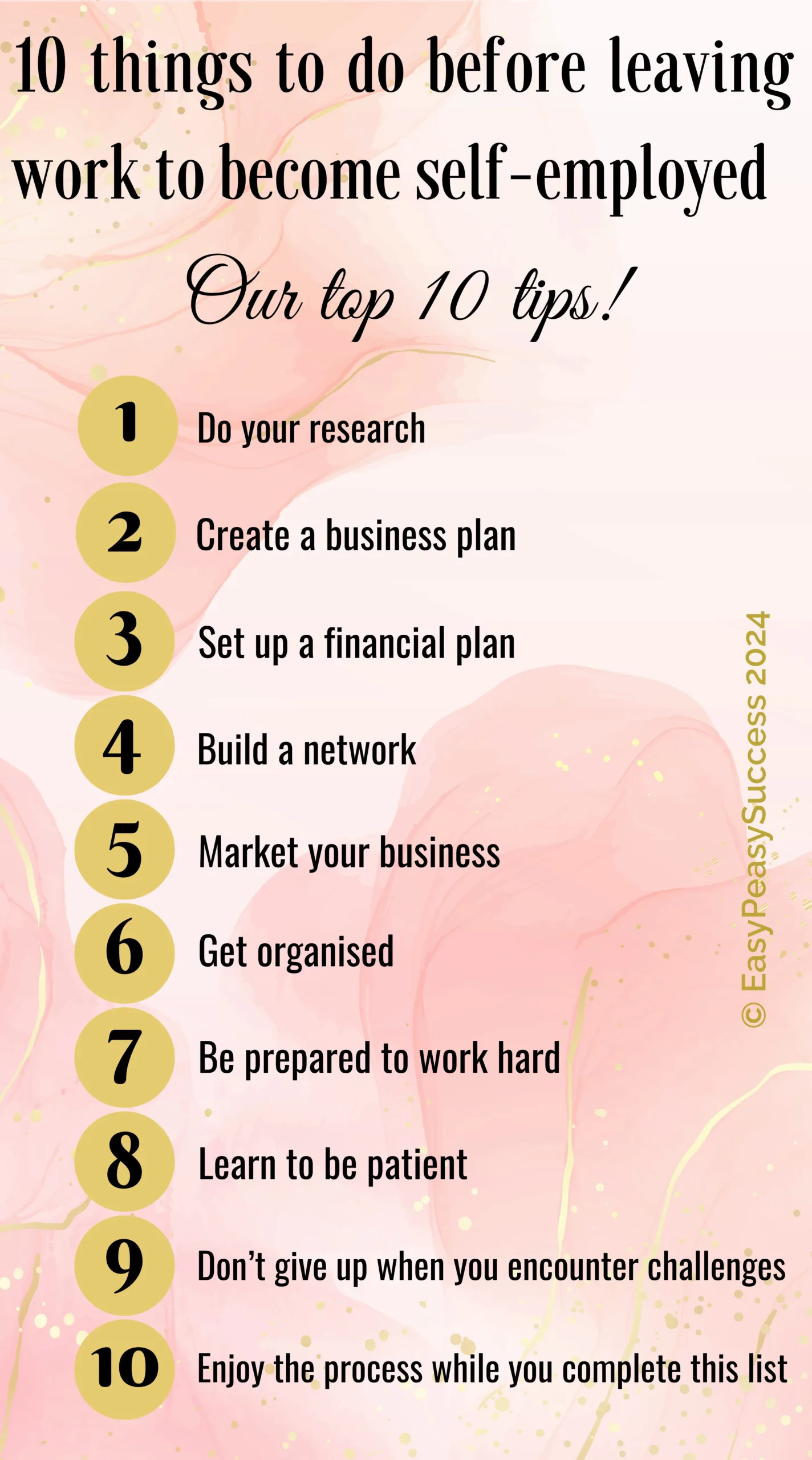Here are 10 things we believe you need to do before leaving work to become self-employed.
So you’re thinking about leaving your job to work for yourself – congratulations! Deciding to start your own business is an exciting time, but it’s important to do your research and make sure you’re fully prepared.
We’d like to share our thoughts on things you need to think about prior to taking the leap to become self-employed, from our own experiences as business owners.
The Main 10 Things you Need to Do Before Leaving Work
1: Do Your Research
Perhaps the most important of the 10 things you can do is research, so you can ensure that working for yourself is right for you.
You’re not just researching the industry you want to work in though. You also need to establish who your potential customers/clients could be, the legal framework around your business, financial implications, etc.
When we first started thinking about starting our own businesses, we spent a lot of time reading books and articles about entrepreneurship. We also talked to other entrepreneurs and got their advice. LinkedIn is a great place to find people to talk to, if you don’t really know anyone in business. (We’re here for you, too, so feel free to fire questions our way! You can contact us here.)
2: Create a Business Plan

This is the roadmap for your business. It needs to include an outline of your goals, strategies, financial projections and any up-front costs. It should also show your prospective customers or clients, as mentioned in step 1.
Your business plan is a living document, ie, you will update it as your business grows. When you do this, it helps you stay focused and on track.
3: Set Up a Financial Plan
When you’re setting up your financial plan, you need to factor in not only obvious but also hidden expenses. Obviously, setting aside money for tax is essential, but don’t forget things like insurance (such as public liability if you’re going into anyone’s home) as well as around 6 months’ worth of living expenses. If you’re lucky enough not to need your current salary, then you can probably ignore that last one, but an emergency financial cushion is definitely required.
4: Build a Network
Networking is essential for any business owner, so get to know other entrepreneurs in your industry. Don’t worry too much about competition; we’ve found that most people are happy to pass on their knowledge and expertise. It feels good to mentor new business owners, and there’s room for everyone. Your own USP (unique selling point) will help make you stand out once you’re up and running.
As mentioned in point 1, LinkedIn can be a great place to find people. But don’t discount other social media sites, where you can network with business owners as well as building relationships with potential customers or clients.
5: Market your Business
This may seem obvious, but without marketing, how are people going to know what your business is all about and what you have to offer?
You can market using online channels, including social media, and/or traditional advertising methods. Start by creating a website and social media account.
There’s no need to be on all social media platforms at once, despite what some people may say. Try to master them one at a time – you can expand them as you go along, should you need to. There are also apps and sites that can help you plan and automate your posts, such as Planoly. You can check out Planoly here (affiliate link*).
6: Get Organised
As a business owner, you’ll need to be organised. This means tracking your finances, managing your time effectively, staying on top of deadlines, etc. If you’re creating content for your website or social media platforms, you may like to get ahead and produce some up front; this can help get you off to a great start.
We use various tools to help us stay organised, such as online calendars, planners, apps, and project management software.
7: Be Prepared to Work Hard
It may seem an obvious thing to say but working for yourself isn’t easy, and you’ll need to be prepared to work long hours and put the effort in, particularly during the planning stages and early days.
There will probably be times you’re working harder than you ever did in a job, but it should be worth it in the long run. If it’s not, then you either need to change how you’re organising your time or realise that working for yourself maybe isn’t for you.
8: Learn to Be Patient
It takes time to build a successful business, so don’t expect to be an overnight success. We’ve been self-employed for several years and have both had to learn to be patient. But we promise you, it’s more than worth it because nothing beats the feelings of achievement that come when you get results.
9: Don’t Give Up When you Encounter Challenges
There will challenges along the way, that’s a given. But if you’re determined, patient, and persistent, you will eventually succeed.
We’ve both faced many challenges during our self-employed years, but we’ve never given up. We prioritise learning and self-growth, and are always striving to improve.
10: Enjoy the Process while you Complete this ’10 Things to Do’ List
Working for yourself can be very rewarding, particularly the freedom and flexibility that it brings. It’s important to remember this and to enjoy the process of working your way through the ’10 things to do’ list.
And Finally
We both love being our own boss, able to set our own hours, work from anywhere we choose, and deciding what we want to do and when we want to do it. We’d love for you to experience the same freedom in your life and we hope you’ve found this article helpful.
If you’re reading this and you’re already self-employed, we’d love to know if you agree with this list of 10 things to do before leaving work. Is there anything you’d add to it? Please let us know.
Disclaimer
*This site uses affiliate links, from which we may earn a small commission. For full details on how affiliate links work, please refer to our full disclaimers.
